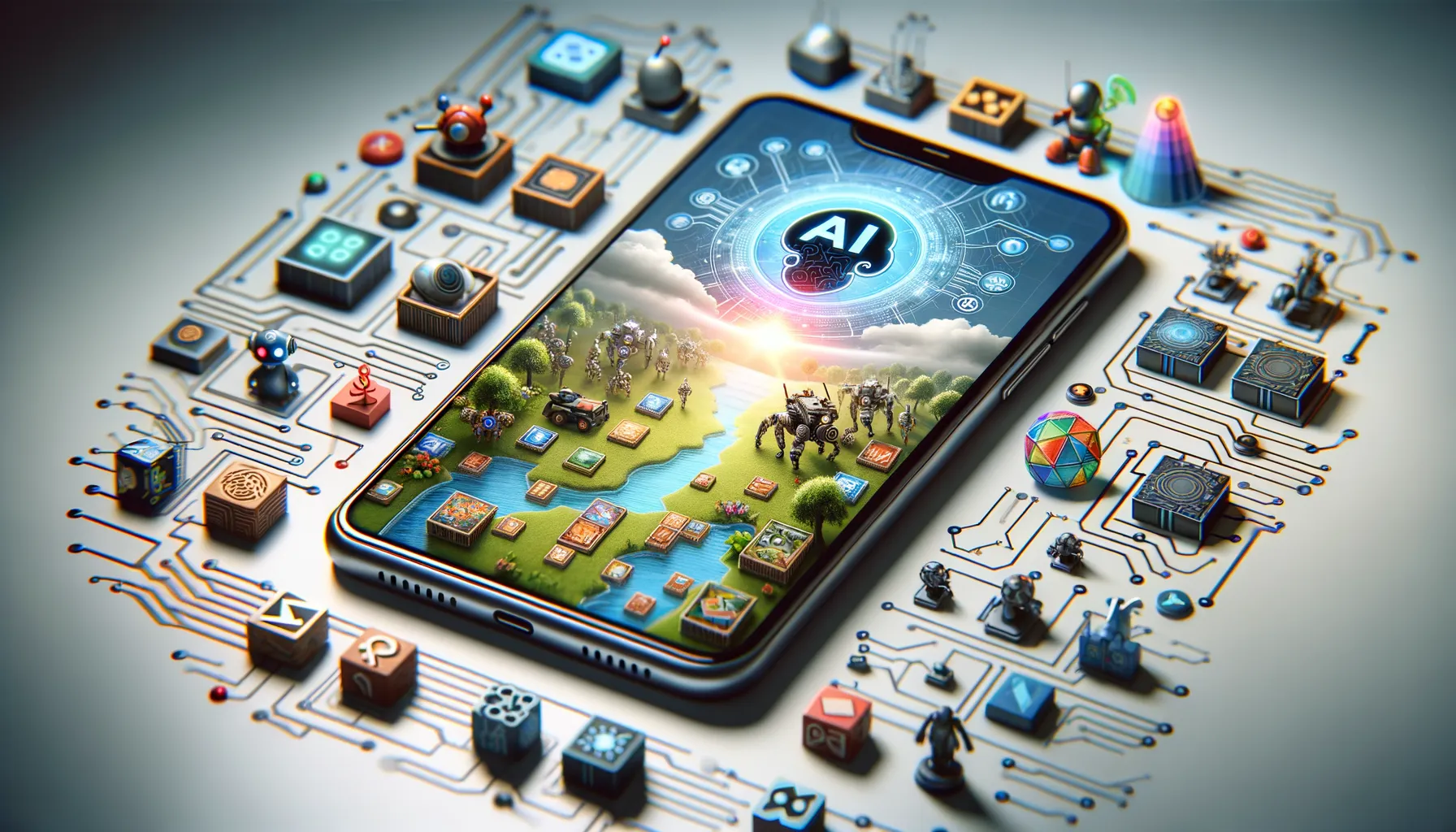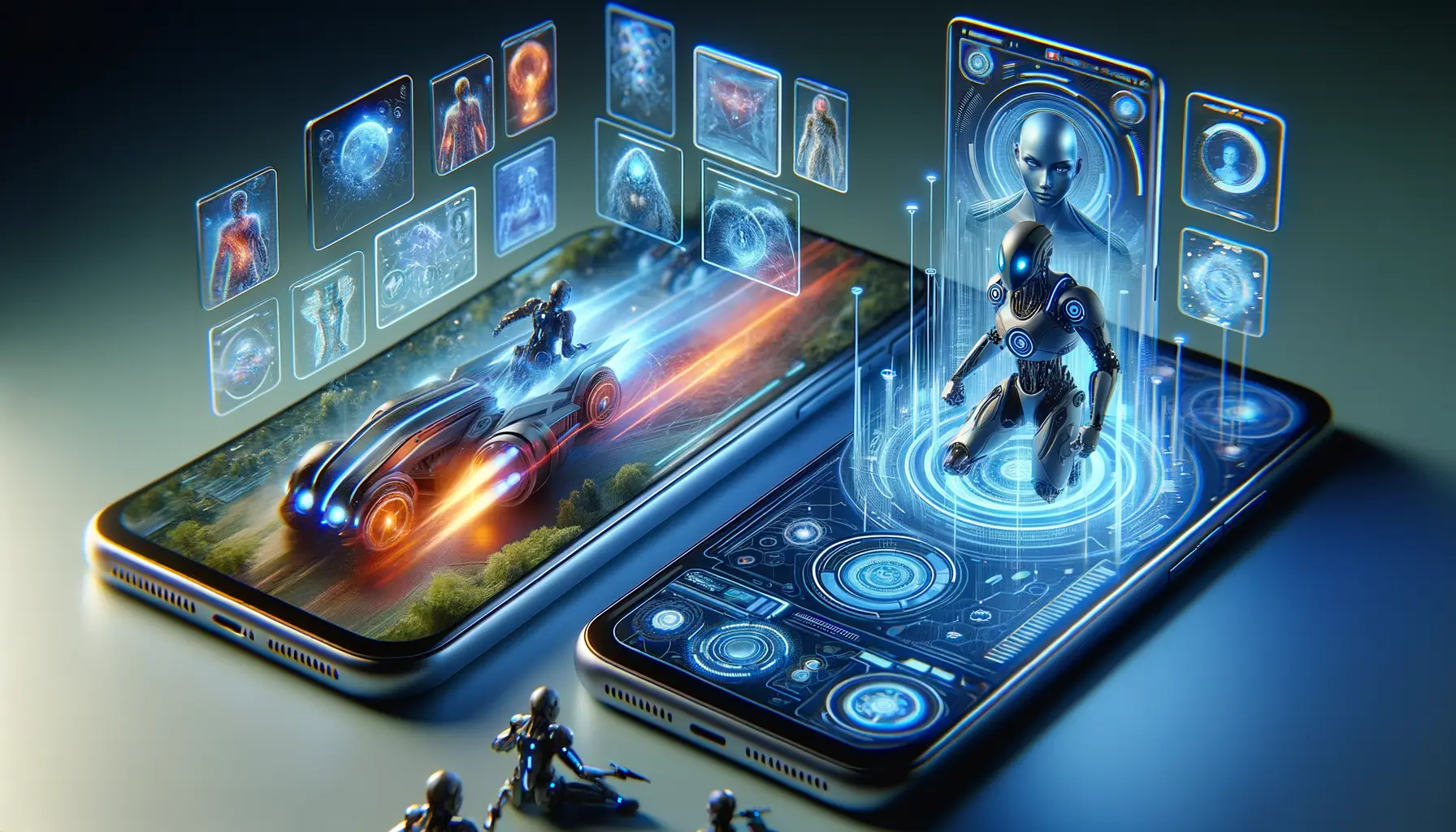Introduction to AI in Mobile Gaming
How AI is Changing the Game
Imagine your favorite mobile game—whether it’s a puzzler that tests your logic or an epic RPG that immerses you in another world. Now, picture this: every time you play, the game learns from your choices. It adapts, surprises, and even challenges you in ways you didn’t see coming. That’s the magic of AI in mobile gaming.
It’s not just about smarter enemies or lifelike characters (though those are pretty cool). AI brings games to life by making them feel, well… alive! For example, ever noticed how some games predict your moves, offering just the right level of difficulty? That’s thanks to machine learning, which analyzes your behavior to tailor gameplay specifically to *you*.
The result? A gaming experience that feels like it’s custom-built for you, moment by moment.
So, next time you’re playing and think, “Wow, how does this game know me so well?”—now you know.
Current Applications of AI in Mobile Games

AI-Powered NPCs: Smarter, Friendlier, and Fun to Play With
Have you ever felt like the non-playable characters (NPCs) in your favorite mobile game were just… flat? Like cardboard cutouts with canned responses? That’s where AI breathes life into gaming worlds. Thanks to advanced algorithms, NPCs are now smarter, more dynamic, and so much fun to interact with. For example, games like AFK Arena use AI-driven NPCs that adapt their strategies based on your playing style. You dodge their attack once? They’ll learn from your moves and hit harder next time. It’s almost eerie how natural it feels—like playing against a real person.
AI doesn’t stop at combat. Think about games like Replika, which uses natural language processing to create emotionally intelligent virtual companions. These aren’t just side characters; they’re chatty, empathetic, and capable of holding meaningful conversations. Suddenly, NPCs aren’t just part of the scenery—they’re part of the story.
Personalized Gameplay That Knows You Better Than You Know Yourself
Gone are the days of grinding through generic levels. Mobile games now leverage AI-based personalization tools to tailor every experience uniquely for you. Consider how Candy Crush adjusts difficulty based on your playing habits. Stuck on a level for too long? It might subtly tweak itself to give you a fighting chance without making it obvious.
Want to see this magic in action? Here are ways AI personalizes your gameplay:
- Adaptive Difficulty: Games analyze your skill and progress, keeping things challenging but never overwhelming.
- Content Recommendations: Love stealth missions? AI ensures you get them more often.
- Dynamic Rewards: Some games, like Pokemon GO, adjust rewards based on how frequently you play, enticing you to keep coming back.
It’s like having your own game designer fine-tuning the experience, just for you. With AI, every tap, swipe, and moment of frustration is part of a master plan to keep you hooked. And let’s be honest… it works.
Future Trends in AI and Mobile Gaming

The Power of Personalization in the Next-Gen Gaming Era
Imagine this: you boot up your favorite mobile game, and it knows exactly what kind of player you are. Whether you’re a casual gamer who loves collecting cute characters or a hardcore strategist obsessed with leaderboards, AI-driven personalization is set to revolutionize mobile gaming.
Soon, games won’t just recommend challenges—they’ll shape entire narratives around YOU. AI will analyze your play style, preferences, and even how much time you have to spare. The result? Tailored missions, real-time difficulty adjustments, and unique story arcs that make you feel like the game was created exclusively for you.
And let’s not forget about NPCs (non-playable characters). They’ll no longer repeat canned lines. Instead, thanks to AI, they might *remember* your past interactions and adapt their behavior accordingly. One day, that grumpy shopkeeper could develop a soft spot for you—or call you out for being stingy last time!
- Hyper-tailored daily quests and rewards
- Narratives that adapt to your emotions or decisions
- Progression systems that flex based on your skill level
Beyond Reality: AI Meets AR and VR
The future isn’t just mobile—it’s immersive. Picture this: you’re in your living room, but your screen connects you to parallel worlds through augmented reality (AR) and virtual reality (VR). When combined with AI advancements, these technologies promise experiences so enthralling, they’ll blur the boundary between game and reality.
AR games of the future will use AI to populate your surroundings with lifelike creatures or map out adventures across your local park. Imagine chasing a dragon in your backyard or defending a fortress that appears—out of nowhere—in your kitchen!
Meanwhile, VR worlds will feel more alive than ever. AI-powered characters may hold full-fledged conversations with you, reacting to your tone of voice or body language. Entire ecosystems could evolve dynamically, meaning no two players would experience the same world.
Let that sink in: gaming won’t just entertain you. It will absorb you, surprise you, and maybe even emotionally move you. Ready to dive in? The future is closer than you think.
Challenges and Ethical Considerations

When AI Meets Grey Areas
AI in mobile gaming isn’t all fun and high scores—it comes with its own messy baggage. For starters, let’s talk about player data privacy. Every time you play, AI gobbles up your gaming habits, preferences, and even how long you hesitate before taking that winning shot. But here’s the thing: who really owns this treasure trove of data? And are developers being upfront about why they need it? Transparency often feels like a missing player in this arena.
Then there’s the issue of fair play. AI-driven matchmaking can be a double-edged sword. It might pair you with opponents who give you just enough challenge to keep you hooked—or, on darker days, pit you against those you have no chance of beating, nudging you toward in-app purchases. Manipulative? Maybe. Clever? Absolutely. Ethical? That’s up for debate.
- What happens when AI-generated characters feel *too* human? Should there be limits to how immersive or addictive mobile games can become?
- And is AI creating opportunities only for players—or stacking the deck in favor of developers’ bottom lines?
These aren’t just “bugs” to fix; they’re bigger questions we all need to wrestle with.
Conclusion and Industry Outlook

Riding the Wave of Innovation
The fusion of AI and mobile gaming is like watching two titans dance—each pushing the other to evolve. As we look ahead, one thing is crystal clear: this is just the prologue of a much larger story. Imagine a world where games don’t just entertain you but truly *know you*. Not in a creepy, sci-fi way, but in a tailored, deeply immersive experience that feels handcrafted just for your tastes.
What excites me most? The whispers of what’s coming next:
- Hyper-personalized games that adapt in real time to your emotions or play style.
- Games powered by advanced AI that create entire universes on-the-fly—no two players exploring the same story.
- Ethical breakthroughs ensuring fair gameplay while still keeping things dynamic and wildly exciting.
The Stakes for Developers and Players
For developers, the stakes couldn’t be higher. Will they embrace the unpredictability of A.I.-generated creativity, or will they play it safe with traditional development? For players, the future feels electric. Picture games that adapt to your skill level mid-session or ones that predict what you’ll love next based on how you interact—not just with the game itself, but even across platforms. It’s exhilarating, but it’s also a fine balance. Moderation, ethics, and inclusivity will need to stay front and center.
We’re at the edge of something revolutionary. Hold tight—it’s going to be a thrilling ride.
